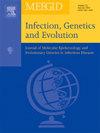Genomic analysis of peste des petits ruminants virus in Europe: Common origin for emergence in Greece, Romania, and Bulgaria
IF 2.6
4区 医学
Q3 INFECTIOUS DISEASES
引用次数: 0
Abstract
Outbreaks of the highly pathogenic small ruminant disease peste des petits ruminants (PPR) were reported in Greece and Romania in July 2024, and central Bulgaria in November 2024. The origin and the link between these outbreaks are not clear. In this study, genome sequences of PPR virus were obtained from samples collected by veterinary authorities in the first farms notified as infected in the three European countries. Genomic analyses confirmed that the emergence of PPR across Europe has a common origin, pointing towards an introduction from Northern Africa, although additional sequencing from the virus currently circulating globally is needed to confirm this hypothesis. More sequencing from the different outbreaks in Europe could also help to resolve the pathway of PPR transmission between and within European countries. Multiple nucleotide and amino acid differences separate the genomes from Europe from other sequences, with potential impact on the functionality of viral proteins to be investigated.
欧洲小反刍兽疫病毒的基因组分析:希腊、罗马尼亚和保加利亚出现的共同起源
希腊和罗马尼亚于2024年7月以及保加利亚中部于2024年11月报告了小反刍动物高致病性疫病(PPR)暴发。这些暴发的起源和之间的联系尚不清楚。在这项研究中,从三个欧洲国家报告感染的首批农场的兽医当局收集的样本中获得了小反刍兽疫病毒的基因组序列。基因组分析证实,小反刍兽疫在欧洲各地的出现有一个共同的起源,指向来自北非的传入,尽管需要对目前在全球传播的病毒进行进一步测序以证实这一假设。对欧洲不同疫情进行更多排序也可能有助于解决欧洲国家之间和国家内部小反刍疫传播的途径。多个核苷酸和氨基酸的差异将欧洲基因组与其他序列分开,对病毒蛋白功能的潜在影响有待研究。
本文章由计算机程序翻译,如有差异,请以英文原文为准。
求助全文
约1分钟内获得全文
求助全文
来源期刊

Infection Genetics and Evolution
医学-传染病学
CiteScore
8.40
自引率
0.00%
发文量
215
审稿时长
82 days
期刊介绍:
(aka Journal of Molecular Epidemiology and Evolutionary Genetics of Infectious Diseases -- MEEGID)
Infectious diseases constitute one of the main challenges to medical science in the coming century. The impressive development of molecular megatechnologies and of bioinformatics have greatly increased our knowledge of the evolution, transmission and pathogenicity of infectious diseases. Research has shown that host susceptibility to many infectious diseases has a genetic basis. Furthermore, much is now known on the molecular epidemiology, evolution and virulence of pathogenic agents, as well as their resistance to drugs, vaccines, and antibiotics. Equally, research on the genetics of disease vectors has greatly improved our understanding of their systematics, has increased our capacity to identify target populations for control or intervention, and has provided detailed information on the mechanisms of insecticide resistance.
However, the genetics and evolutionary biology of hosts, pathogens and vectors have tended to develop as three separate fields of research. This artificial compartmentalisation is of concern due to our growing appreciation of the strong co-evolutionary interactions among hosts, pathogens and vectors.
Infection, Genetics and Evolution and its companion congress [MEEGID](http://www.meegidconference.com/) (for Molecular Epidemiology and Evolutionary Genetics of Infectious Diseases) are the main forum acting for the cross-fertilization between evolutionary science and biomedical research on infectious diseases.
Infection, Genetics and Evolution is the only journal that welcomes articles dealing with the genetics and evolutionary biology of hosts, pathogens and vectors, and coevolution processes among them in relation to infection and disease manifestation. All infectious models enter the scope of the journal, including pathogens of humans, animals and plants, either parasites, fungi, bacteria, viruses or prions. The journal welcomes articles dealing with genetics, population genetics, genomics, postgenomics, gene expression, evolutionary biology, population dynamics, mathematical modeling and bioinformatics. We also provide many author benefits, such as free PDFs, a liberal copyright policy, special discounts on Elsevier publications and much more. Please click here for more information on our author services .
 求助内容:
求助内容: 应助结果提醒方式:
应助结果提醒方式:


